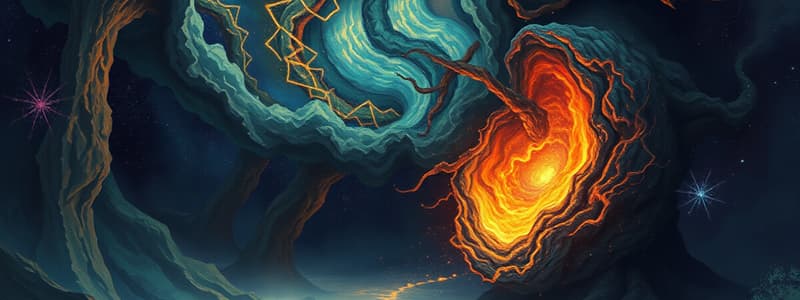Podcast
Questions and Answers
What term refers to the practice of interpreting the symbolisms in dreams as a way to access the unconscious?
What term refers to the practice of interpreting the symbolisms in dreams as a way to access the unconscious?
- Interpretative Analysis
- Unconscious Thought Process
- Dream Analysis (correct)
- Freudian Slip
Which component of the psyche encompasses everything of which we are conscious?
Which component of the psyche encompasses everything of which we are conscious?
- Shadow
- Personal Unconscious
- Collective Unconscious
- Ego (correct)
In Jung's stages of development, which stage focuses on learning a vocation or craft and raising a family?
In Jung's stages of development, which stage focuses on learning a vocation or craft and raising a family?
- Childhood
- Middle Age
- Young Adulthood (correct)
- Adulthood
What is the term for the displacement of an unacceptable idea to something symbolically equivalent in dream analysis?
What is the term for the displacement of an unacceptable idea to something symbolically equivalent in dream analysis?
How does Carl Jung's concept of libido differ from Freud's view?
How does Carl Jung's concept of libido differ from Freud's view?
What does the Anal rejection complex entail?
What does the Anal rejection complex entail?
In Gordon Allport's Trait Paradigm, which type of disposition is described as influencing all aspects of a person's behavior?
In Gordon Allport's Trait Paradigm, which type of disposition is described as influencing all aspects of a person's behavior?
Which complex is characterized by a desire to return to pre-birth conditions?
Which complex is characterized by a desire to return to pre-birth conditions?
What characterizes the Oral aggression complex?
What characterizes the Oral aggression complex?
What is a defining feature of the Urethral complex?
What is a defining feature of the Urethral complex?
Flashcards are hidden until you start studying
Study Notes
Freudian Concepts
- Freudian slips, or parapraxes, reveal unconscious thoughts and feelings.
- Dream analysis is considered a pathway to consciousness, focusing on symbolism.
- Condensation occurs when a part symbolizes a whole (e.g., a clothing item represents a person).
- Synthesis combines multiple latent ideas into a single dream representation (e.g., a pet signifies an entire family).
- Dislocation involves displacing unacceptable ideas onto something symbolically equivalent (e.g., breasts represent mountains).
- Humor enables expression of repressed thoughts in socially acceptable ways.
Carl Jung and Analytic Psychology
- Jung viewed libido as a creative force contributing to psychological growth.
- Human behavior is driven by both past experiences and aspirational future goals (teleology).
Stages of Development
- Childhood (birth to adolescence): Focus on survival skills and sexuality.
- Young Adulthood (adolescence to 40 years): Development of a vocation, family life, and community involvement.
- Middle Age (40 years onwards): Growth of cultural, philosophical, and spiritual values.
Components of Psyche
- Ego comprises all conscious thoughts and feelings.
- Personal unconscious consists of repressed memories, forgotten details, and incomplete impressions.
- Complexes, such as the "mother complex," are clusters of emotionally charged ideas that impact behavior.
- Senescence refers to a decline in the capacity for new psychological compositions in later life.
Complexes
- Claustral complexes relate to pre-natal experiences and include fear of helplessness.
- Oral complexes stem from early feeding experiences and involve dependency and aggression.
- Anal complexes focus on issues related to feces, sexuality, and aggression.
- Urethral and genital complexes revolve around ambition, self-esteem, and fear of parental punishment related to sexuality.
Trait Theory by Gordon Allport
- Personality defined as a dynamic organization of psychophysical systems influencing behavior and thought.
- Personal dispositions categorized into cardinal, central, and secondary traits.
Filipino Social Values
- Pakikipagpalagayang-loob emphasizes rapport and acceptance.
- Pakikisangkot signifies active involvement in community activities.
- Pakikiisa denotes a sense of unity with others.
- Hiya influences spending behaviors to maintain social appearances.
- Bahala Na reflects fatalistic resignation and avoidance of responsibility.
- Utang na Loob represents debt of gratitude.
Analytical Framework of Philippine Values
- Surface values include Hiya (propriety) and Utang na Loob (gratitude).
- Core value is Kapwa, emphasizing shared identity and interconnectedness with others.
- Pivotal interpersonal value Pakiramdam, represents shared inner perception and sensitivity.
Deviance and Social Norms
- Deviance defined contextually; behaviors labeled deviant vary by cultural norms.
- Social definitions shape perceptions of deviance.
- Deviance can affirm cultural norms and clarify moral boundaries.
Theoretical Foundations of Deviance
- Strain Theory posits that deprivation of opportunities leads to deviant behavior, particularly in pursuit of culturally valued goals.
- Differential Association Theory suggests criminal behavior is learned through social interactions.
Patterns of Mate Selection
- Endogamy dictates marriage within one's own race or social group.
- Exogamy allows for marrying outside one’s group, enhancing community ties.
Inheritance and Descent Systems
- Inheritance often leads to family disputes, highlighting material differences in wealth distribution.
- Descent can be bilateral (both parents) or unilateral (either mother or father), influencing kinship and familial ties.
Studying That Suits You
Use AI to generate personalized quizzes and flashcards to suit your learning preferences.




